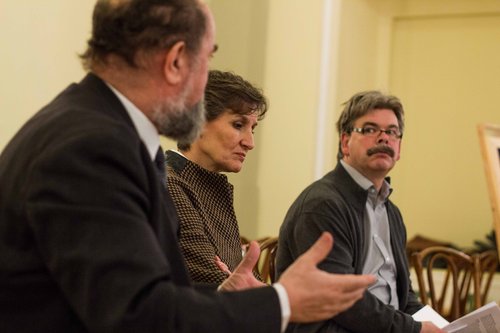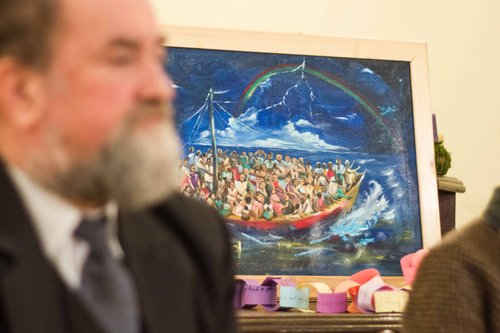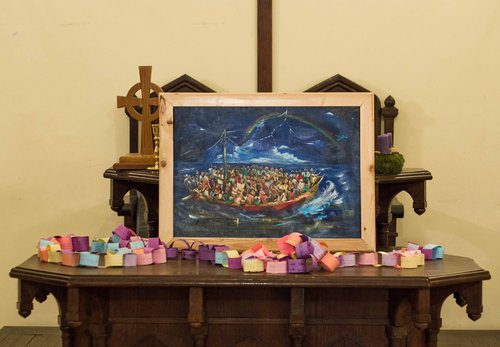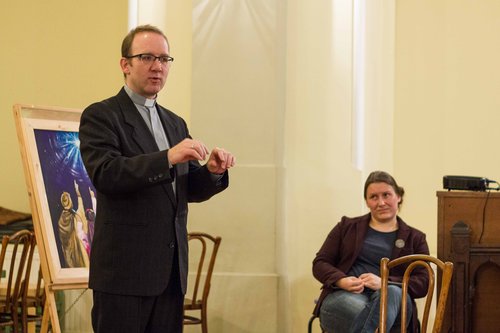Church and Asylum: Providing space for the marginalized
2015. december 21., hétfő"Any church should have a place for the vulnerable. It might be women. It might be children. In our case, it means making space for refugees. For other churches, it might mean something different; but there always has to be a space for the marginalized." - in giving voice to this conviction at a recent conference, Rev. Bernhard Fricke reminded attendees that one of the most important roles of a church and its congregations is to provide safe space for those who are on the fringes of society, and who need to find sanctuary—safe space.
The conference, entitled "The Church and Refugees—What Congregations Might Do", focused specifically on the ministry of asylum for refugees. The conference was hosted jointly by the Reformed Scottish Mission in Budapest, the Refugee Minstry of RCH and by its implementing partner, the Kalunba non-profit Ltd. at the St. Columba's Church, on December 10.
"We have wanted to address this issue for a long time," said RCH Refugee Ministry director Dóra Kanizsai-Nagy. "We have been aware of the work of churches in Germany working to assist refugees with asylum. With recent legal and other changes in Hungary in recent months, now seemed to be the right time to invite Rev. Fricke to meet with us."

Rev. Bernhard Fricke is a chaplain to detained refugees in Germany, and a pastoral team member of "Asylum in the Churches", a network of churches in Germany. Rev. Fricke did not come to Budapest to "tell us what to do," but rather simply to share information and stories based upon his team's ministries in Germany, and to be a catalyst for thought and discussion amongst those Hungarians, refugees and others gathered at the Scottish Mission. In addition to Rev. Fricke, other special guests included Hungarian Reformed pastor and theologian Rev. Zoltán Bóna, and Ms. Montserrat Feixas Vihé, UNHCR Regional representative based in Budapest.
Rev. Bóna set the biblical and theological foundation for the day, emphasizing the Missio Dei, that is, "the mission of God," or "the sending of God." The missional task of the church is to proclaim the gospel in deed and in word, despite the circumstances of the time. Referring to Jesus' parable of the sower and the seeds, with some seeds falling on thorny or dry ground, and other seeds falling on good soil, Rev. Bóna observed that when the church speaks to society, we need to recognize that people will be hearing the message with differing points of view. Nevertheless, the church has the unique role of proclaiming the gospel, both in agreeable times and in less agreeable times. The message of the church is the gospel, not politics. Yet when the church speaks to the world, especially to the practical needs and ethical challenges presented in the world, the practicalities of proclamation—the doing of the gospel—may well have political implications.

The church may cooperate with governments and other powers when the values are compatible, Rev. Bóna said, but independence is desired for the churches' voice to be proclaimed and demonstrated both in stable and in unstable times. Finally, the church must be compelled to advocacy: advocating for just legislation at the governmental level, and advocating on behalf of the poor and oppressed, whose voices are often not heard. A great reminder of the church's role in advocacy is the Barman Declaration of 1934, which addressed the injustices perpetuated by the Nazi regime. This declaration has inspired the church to speak against injustice many times since then, such as when it was called to speak against apartheid in South Africa. Some churches collaborate with injustice, which is against biblical teaching. The church is called to a different path: to do justice, to love mercy, and to walk humbly with God (Micah 6:8).
Ms. Montserrat Feixas Vihé briefly gave greetings to the gathered group on behalf of the United Nations High Commission on Refugees (UNHCR) regional office. She underscored the value of churches and other non-government organizations (NGOs) in addressing needs and concerns of a global crisis, at the local level. The work of the church is noted, needed, and appreciated, she said. Perhaps most notably, Ms. Feixas Vihé called the participants' attention to the UNHCR website page, „An Affirmation of Faith".
Shifting from theology to practice, half of the conference was dedicated to a presentation by Ref. Fricke on the Church and Asylum movement, specifically in Germany, where the concept is not an abstract concept, but a practical reality.

The Asylum in the Churches ecumencial network in Germany is a movement with 30 years of experience. It began at the grass roots level with one congregation deciding they did not want to see local refugees deported back to countries they fled for fear of destitution, persecution, or other suffering. The idea of protecting people form deportation is not accepted in all areas of the church. However, it is significant that the commitment to providing asylum or sanctuary, providing safe space and assistance, spread from the decision of one congregation to many more congregations. What is church asylum? The network defines it this way:
Church asylum is a form of temporary protection for refugees without a legal residence status who would face unacceptable social hardship, torture or even death if forced to return to their country of origin. During the church asylum, all relevant legal, social and humanitarian aspects are examined. In many cases it turns out that the authorities' decisions need to be revised, which means that a new asylum procedure has a chance of success.
Records of Asylum in the Churches reveal that a great majority of the reconsidered cases have positive outcomes, protecting the applicants from a violation of their human rights, from the dangers that would result from deportation. Rev. Fricke reported that he knows of 281 current cases of asylum in the churches, representing 446 persons, including almost 100 children.
Congregations providing asylum support make a serious commitment. They provide living space, cooking and sanitary facilities, food, and sometimes clothing or medical care when needed. The network offers theological and legal counsel, and facilitates sharing information between congregations, between churches and government, and with other agencies. Host congregations understand that reviewing and reprocessing individual asylum cases requires time, often months.
"Church asylum is the last legitimate resort for a parish in order to protect refugees for a limited time and to bring about a timely re-examination of their protection status as guaranteed by the state." - Basic information on Church Asylum.
Rev. Fricke reminded the conference attendees of the biblical mandate for providing hospitality to strangers, a mandate common to all Abrahamic religions. As scripture says, "Do not forget to show hospitality to strangers, for by so doing some people have shown hospitality to angels without knowing it" (Hebrews 13:2). "Christians are called to join together with refugees in a pilgrimage for peace, and justice, and full hope for the promised fulfillment of life," Rev. Frick concluded.

St. Columba's Reformed Church of Scotland has been ministering with refugees for the past ten years or so. The work was initiated by mission co-workers (Kathy and Joe Angi) of the Reformed Church in Hungary, from the Presbyterian Church (USA). The congregation's commitment to refugees has continued with the active support of its current pastor, Rev. Aaron Stevens. While St. Columba's is not part of the sanctuary movement as described by Ref. Fricke, it has provided shelter, food, clothing and practical help for refugees from Syria and elsewhere, and supports the work of the Kalunba organization by providing space for team gatherings, meals and cultural events, Hungarian language lessons, and more. Raising awareness within the congregation is also an ongoing activity. For example, at the conference Rev. Stevens showed a large paper chain sent from another Presbyterian congregation abroad. Each link of the chain contained a hand-written prayer on behalf of refugees in Hungary, which have become part of the church's prayers.
The plight of refugees is a global concern. In the end, however, the difference is made at the local level—in local communities around the globe. The church has the opportunity, and the mandate, to take the lead.
Dr. Richard Otterness
Photos: Máté Diósi
Contact us
Click here if you are interested in twinning.
Reformed Church in Hungary
Address: H-1146 Budapest, Abonyi utca 21.
PO Box: 1140 Budapest 70, Pf. 5
Email: oikumene@reformatus.hu
English, German and Korean language services in Budapest
Links
Recommended articles
-
Pastoral Letter in the Light of the Pandemic
Bishop Dr. István Szabó sent a pastoral letter of encouragement to the ministers serving in RCH’s congregations, expressing his gratitude for the persistence and creativity of the pastors.
-
RCH Joins in Pope's Call for Prayer
RCH published the call on congregations to join the initiative of Pope Francis, supported by ecumenical organisations, to unite in praying the Lord’s Prayer on Wednesday, 25 March, at noon.
-
English Speaking Worship Services Online
Each Sunday at 11 AM (CET) the St. Columba's Church of Scotland in Budapest, the international community of RCH invites you to join the worpship service on its facebook page.
-
Test of Humanity and Companionship
Reformatus.hu asked Dr. György Velkey, Director General of the Bethesda Children’s Hospital of RCH about the challenges of health care workers and ways of prevention against the pandemic.
-
All Church Events Suspended
In light of the coronavirus the Presidium of RCH requested congregations to suspend all church events with immediate effect. Beside restrictions, it calls for prayer, sobriety and responsibility.











